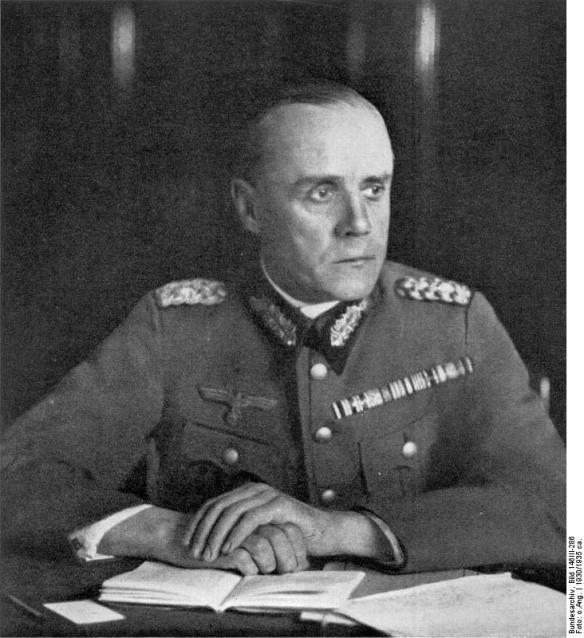A few brave spirits did listen to their consciences, and decided that Hitler was an evil genius to Germany who must be removed. For doing so they were generally reviled during their lifetime and for some years after their death, but one gets the impression that the young Germans of today see the heroic and tragic side of their actions.
Chief among these men was Colonel-General Ludwig Beck. He was born near Wiesbaden in 1880 and joined the 15th Prussian Field Artillery Regiment in 1908. Most of Beck’s career was spent on the Staff, in which he had wide experience in the Great War, but he was not a mere office soldier. Between the wars he commanded an artillery battalion and then a regiment, and in 1932, as a major-general, the 1st Cavalry Division. But he was unexcelled as a Staff Officer, and won the respect of the whole Army for his ability, approachability, and clear expression of his ideas. In 1933 he became Head of the Truppenamt, and in July 1935, as a general of artillery, Chief of Staff of the Army, holding this all-important post for over three years. But they were extremely difficult years for Beck. There was the conflict between Hitler and von Blomberg, on the one hand, and von Fritsch and many of the senior officers on the other; and there was Beck’s wish to keep the peace while he saw, and to an extent naturally welcomed, the rearming of Germany and the strengthening of the Army.
Beck was one of the first to see through Hitler, though he seldom had any contact with him and was in fact an isolated man. He felt that his main task was to reconstitute the General Staff which had crumbled away in 1918, and this he did with some success. But the intrigues of Reichenau, Keitel, and Jodl impeded him, since they fostered the ‘Führerprinzep’ school of thought which relegated the General Staff to being the mere executor of the Leader’s will, instead of his responsible adviser on equal terms.
In May 1938 Hitler announced in private to various senior officers his unshakable determination to crush Czechoslovakia. Beck foresaw a general war breaking out if this happened, and demanded specific guarantees from Hitler that he did not intend to start war. Hitler refused, and told Beck his function was to carry out the tasks that a statesman gave him. Beck now instructed one of his friends and colleagues, Major- General Karl-Heinrich von Stülpnagel, to canvas the generals about the prospects of collective military action against Hitler. Nothing seems to have come of this.
He also issued a paper to show what would be the results of an attack against Czechoslovakia, which was subscribed to by all heads of department in the General Staff. But the real power on the military side lay not with Beck but with von Brauchitsch, the Commander-in-Chief of the Army. Beck wrote to him: ‘The leaders of the Wehrmacht will incur the guilt of shedding human blood unless they are guided both by their expert knowledge and their conscience. The limit to their soldierly duty of obedience is set at that point, where their conscience and sense of responsibility forbids them to carry out their orders. . . .’ Brauchitsch, while sympathetic, was reluctant to take action, probably because he had not long been in office. When he called a meeting of all Corps and Army commanders on 4 August 1938 he described the situation as serious but did not back up Beck’s demand that Hitler be forced to abandon his preparations for war. Nor did he read out a passage in Beck’s memorandum which might have rallied the doubters. The unread words were: ‘In order to safeguard our position before history and to keep the repute of the Supreme Command of the Army unstained, I hereby place on record that I have refused to approve any warlike adventures of the National Socialists…’
Beck now felt that he had little choice but to resign, which he did on 18 August 1938. He briefly commanded an Army on the West Wall in September, but on 31 October was retired as a colonel-general and never held another appointment.
All through the war Beck was the unquestioned leader of the anti- Hitler generals, but he was largely ineffective because he had no Army command with which to exercise power. It was a mistake for him to have resigned in 1938.
